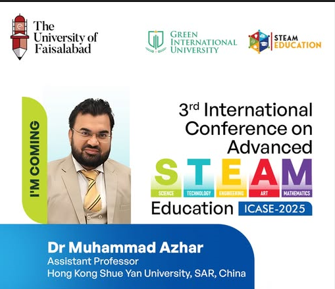Data Science Without Borders: Driving Innovation in Global R&D
Venue 1 – Ali Auditorium
Track: Computer Science 1
Chair: Dr. Gufran Khan, CEO – Visibility Bots, Pakistan
Co-Chair: Dr. Abdul Rauf, The University of Faisalabad
Introduction
In an era where global challenges outpace individual scientific capabilities, the concept of “Data Science Without Borders” has emerged as a transformative pillar for modern research and development. This theme formed the core of an impactful session held at Ali Auditorium under Computer Science Track 1 during the STEAM Conference 2025. The session emphasized that data-driven innovation can only reach its full potential when international researchers, institutions, and industries collaborate beyond geographical and political boundaries.
Chair Dr. Gufran Khan, a leading figure in AI automation and CEO of Visibility Bots, opened the session by underscoring the importance of cross-border data ecosystems. He emphasized that breakthroughs in AI, healthcare, climate science, and industrial automation now rely on integrated global datasets rather than isolated national repositories. Co-Chair Dr. Abdul Rauf highlighted the need for Pakistani researchers to actively participate in international data-sharing initiatives to enhance national competitiveness and accelerate scientific growth.
Together, they framed an insightful and forward-looking discussion on how borderless data science is reshaping global R&D collaborations.
The Keynote Insight: Prof. Kamran Munir (University of West England, UK)
The keynote talk delivered by Prof. Kamran Munir provided a deep exploration into the global digital transformation driven by data science. He explained that the world’s most pressing issues—ranging from healthcare crises to environmental sustainability—cannot be solved by any single institution or country. Instead, they require shared intelligence, interoperable platforms, and collaborative research infrastructures.
Prof. Munir highlighted the growing relevance of federated learning, which allows multiple organizations to collaboratively train AI models without exchanging raw data. This approach ensures compliance with data privacy regulations while enabling high-quality global research. He emphasized that federated frameworks democratize AI innovation by allowing developing countries to participate in high-level R&D without massive local computing resources.
His keynote set the foundation for the session’s central message: data science must transcend borders to accelerate human progress.
Invited Talks Strengthening the Global Data Vision
Decentralized Knowledge Sharing Through Federated Large Language Models
Muhammad Azhar – Hong Kong Shue Yan University, SAR China
Azhar presented a pioneering approach to collaborative STEAM education through decentralized large language models. He explained how universities across Asia, Europe, and beyond can jointly train AI tutoring systems without exposing sensitive student records. This research supports a future where global education is equitable, secure, and technology-driven.
Fuzzy Soft Graphs for International Manufacturing Intelligence
Kanwal Amber – NFC IE&FR, Faisalabad, Pakistan
Kanwal introduced cutting-edge innovations in Fuzzy Soft Graphs, demonstrating their utility in optimizing manufacturing processes across borders. She illustrated how industries in different countries can share anonymized production patterns to improve decision-making, reduce breakdowns, and build intelligent supply-chain systems—strengthening global industrial networks.
Alzheimer’s Detection Through Explainable Federated Learning
Umair Amin – The University of Faisalabad
Umair presented a next-generation multimodal framework combining MRI scans, patient history, and neurological markers. By using explainable federated learning, hospitals in different countries can collaborate without compromising patient confidentiality. His work showcased the power of borderless healthcare analytics in early disease detection.
Local-First Large Language Models for Privacy and Productivity
Muqadsa Jabeen – The University of Faisalabad
Muqadsa introduced “Private Eye,” a framework evaluating the efficiency of local-first LLMs designed for maximum privacy. Her research offers a robust alternative to cloud-based AI systems by allowing organizations to deploy high-performance models locally—critical for governments, legal firms, and healthcare providers handling sensitive data.
AI-Driven Dental Diagnostics Using YOLO Models
Muhammad Hannan – The University of Faisalabad
Hannan shared innovations in automated dental caries detection using YOLO-based deep learning. His model can identify and classify dental issues from panoramic radiographs with high accuracy, supporting global dental healthcare systems in early diagnostics and personalized treatment planning.
AI for Enhanced Medical Imaging and Diagnosis
Ahmed Shahzad – The University of Faisalabad
Ahmed expanded on the role of AI-driven radiology, focusing on automated medical imaging analysis. His work highlighted how shared AI frameworks across hospitals worldwide can reduce diagnostic errors, accelerate treatments, and lower healthcare costs.
Why Borderless Data Science Matters
Throughout the session, experts highlighted how cross-border collaboration strengthens global research ecosystems by enabling:
- Faster scientific breakthroughs
- Reduced development and diagnostic costs
- Unified global response to pandemics and disasters
- Development of unbiased, diverse datasets
- Democratization of AI access for developing nations
- More transparent, explainable, and ethical AI solutions
However, the session also recognized challenges such as data privacy laws, ethical governance, risk of intellectual property loss, and algorithmic bias—all of which require unified global frameworks.
Conclusion
The “Data Science Without Borders” session at STEAM Conference 2025 demonstrated that global cooperation is no longer optional—it is the future of scientific progress. Under the leadership of Dr. Gufran Khan and Dr. Abdul Rauf, and enriched by the contributions of Prof. Kamran Munir, Muhammad Azhar, Kanwal Amber, Umair Amin, Muqadsa Jabeen, Muhammad Hannan, and Ahmed Shahzad, the session delivered a unified message:
True innovation begins when data flows freely, securely, and ethically across borders.
As countries and institutions embrace collaborative data ecosystems, the world moves closer to achieving sustainable, inclusive, and transformative scientific advancements.

